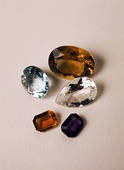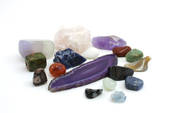|
Smart Jewelry Shopper How to Buy Jewelry & Gemstones With Confidence |
 |
Gemstone Differences There are many different types of gemstones which vary in price range. It is essential to know a few facts in order to make an educated purchase. Natural Gemstones Although natural gemstones can be enhanced to improve their clarity or color, they are generally known to be found or created in nature. This means they are usually mined from the earth. Heat can be utilized to bring out the natural radiance but these are not lab created or imitations. One example of a gemstone treatment can be found in Tanzanite. In it’s natural form this gem is a brownish color. Once heat is applied, the vibrant blue-purple that most people are familiar with comes out. Natural gemstones are not perfect and contain flaws or “inclusions”. This is caused by small traces of minerals trapped within the stone’s crystallization process. The extraneous gases, minerals and molten mass comprise the uniqueness of the flaws which are naturally found. Natural gemstones are more expensive and highly demanded by our culture, in spite of the imperfections they contain. If you are looking for high quality and precision cut designer gemstones, I recommend checking out Bespoke Gems for some of the finest gems. Lab Created To create gemstones, a laboratory will take the same basic mineral composition of the gemstones naturally and mimic high pressures and heat found in nature to create identical replicas. The main difference between natural and lab created gems are the flaws which will most likely be found in the natural stones. These “inclusions” are however favored since a too perfect gem can often look unnatural or phony. Laboratory created gemstones use the exact same process as nature and therefore offer buyers a flawless stone which replicates color, composition, luster and hardness. Since natural gemstones are highly priced, many lab created gemstones are sold today. The most popular are Rubies and Sapphires which are easy to recreate in a lab setting. Others are more difficult to duplicate such as Emeralds and Aquamarines. The clarity of a lab created gemstone generally surpasses that of a natural one. Simulated Gemstones Low cost jewery or imitation jewelry would fall under this category. These gemstones are created to look identical to true gemstones but do not consist of the same mineral composition as natural or lab created gems. It is important to understand whether your gemstone is labcreated as imitation or with the same components of a natural gemstone. By following this guide to buying gemstones, you should be able to ask the jewler a few educated questions and know what you prefer. It is essential to go with a well known and well reputed jewler to insure you are not scammed into purchasing false gems or imitations.
|
 |
|
 Purchasing jewelry like
Purchasing jewelry like  To insure you are an educated consumer in the gem industry, it will help
knowing what to look for before buying. These are some of the questions you should ask
your jewler.
To insure you are an educated consumer in the gem industry, it will help
knowing what to look for before buying. These are some of the questions you should ask
your jewler.